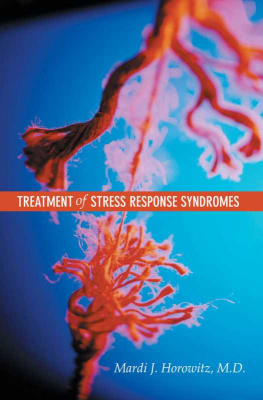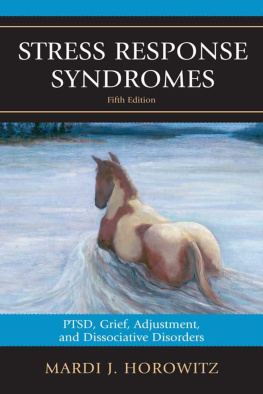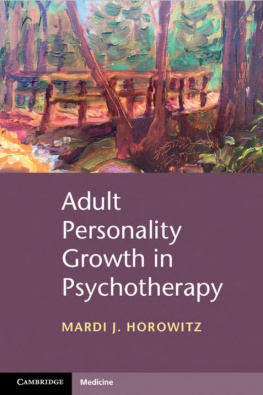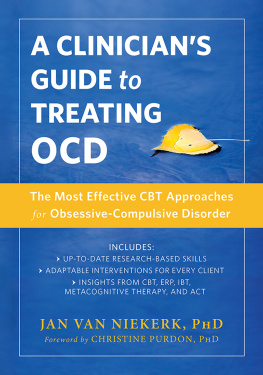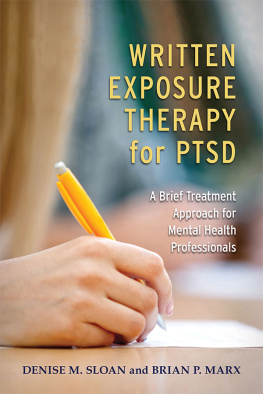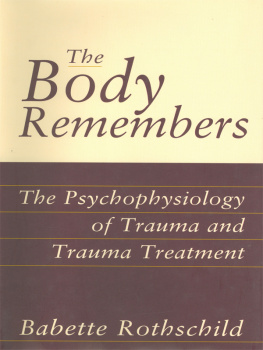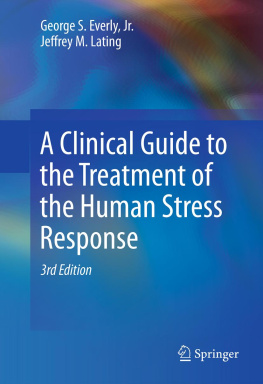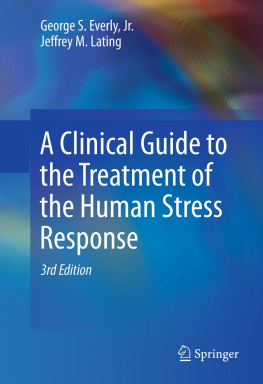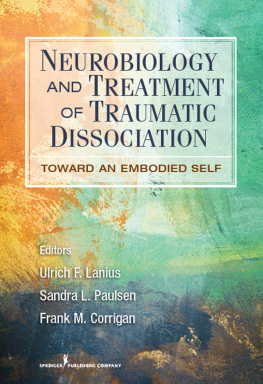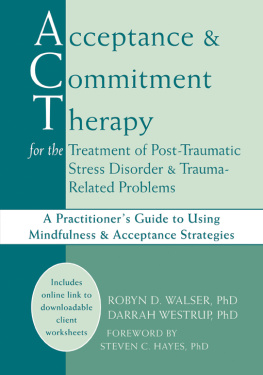TREATMENT OF STRESS RESPONSE SYNDROMES
This page intentionally left blank
TREATMENT OF STRESS RESPONSE SYNDROMES
Mardi J. Horowitz, M.D.
Professor of Psychiatry University of California, San Francisco
Note: The authors have worked to ensure that all information in this book is ac
curate at the time of publication and consistent with general psychiatric and medical standards, and that information concerning drug dosages, schedules, and routes of administration is accurate at the time of publication and consistent with standards set by the U. S. Food and Drug Administration and the general medical community. As medical research and practice continue to advance, however, therapeutic standards may change. Moreover, specific situations may require a specific therapeutic response not included in this book. For these reasons and because human and mechanical errors sometimes occur, we recommend that readers follow the advice of physicians directly involved in their care or the care of a member of their family.
Books published by American Psychiatric Publishing, Inc., represent the views and opinions of the individual authors and do not necessarily represent the policies and opinions of APPI or the American Psychiatric Association.
Typeset in Adobe's Janson Text and DINNeuzeitGrotesk.
Copyright 2003 American Psychiatric Publishing, Inc.
ALL RIGHTS RESERVED
Manufactured in the United States of America on acid-free paper 07 06 05 04 03 5 4 3 2 1
First Edition
American Psychiatric Publishing, Inc.
1400 K Street, N.W.
Washington, DC 20005 www.appi.org
Library of Congress Cataloging-in-Publication Data
Horowitz, Mardi Jon, 1934
Treatment of stress response syndromes / Mardi J. Horowitz. p. ; cm.
Includes bibliographical references and index.
ISBN 1-58562-107-2 (alk. paper)
1. Stress (Psychology) 2. Stress management. 3. Post-traumatic stress disorderTreatment. 4. Life change events. I. Title.
[DNLM: 1. Stress, Psychologicaltherapy. 2. Life Change Events. 3. Stress Disorders, Post-Traumatictherapy. WM 172 H816t 2002]
RC455.4.S87 H67 2002 155.9'042dc21
2002071115
British Library Cataloguing in Publication Data
A CIP record is available from the British Library.
For Carol, with love
This page intentionally left blank
Contents
This page intentionally left blank
Preface
T his book covers treatment for mental disorders precipitated by the experience of traumatic life events. The basic principles involve understanding symptom formations and the treatment that can lead to resolution of the causes of protracted distress. These principles are grounded in clinical research, a theoretical synthesis of which has been presented in detail elsewhere . In the present work, the goal is a brief, thorough coverage of an integrated treatment that follows biopsychosocial models and amalgamates different types of therapy.
I have avoided the approach of using chapters as containers of different diagnoses, such as posttraumatic stress, acute stress, adjustment, and other disorders. Instead, I have organized the book by stages of treatment, because essential explanatory principles encompass a range of diagnostic entities; it is easier for clinicians to understand actions based on these principles than to consult and study guidelines for each separate disorder (). To complement the focus on broad principles, such as those that govern the formation of intrusive and avoidant symptoms, this book emphasizes the importance of explaining a disorder through individualized case formulation. The process for doing this, configurational analysis, is described and illustrated. This integrative approach leads to the development of effective treatment plans and will relate well with what the clinician already knows.
Treating stress response syndromes requires that the clinician listen to stories that are sometimes quite devastating. It is my hope that this book will provide therapists with the necessary tools to support and foster coping skills in their patients as they move through their therapeutic journey: reasons to hope for improvement, courage in facing the repercussions of traumatic events, and the emotional stamina and knowledge needed to find a route to adaptive change.
This page intentionally left blank
Acknowledgments
I have been very well supported in scientific studies on the psychological
effects of stress by the University of California San Francisco, the National Institute of Mental Health, the John D. and Catherine T. MacArthur Foundation, and the Center for Advanced study in the Behavioral Sciences at Stanford University. Sharing the work and development of ideas were many assistants, associates, patients, and trainees. My principal colleagues were (in alphabetical order) George Bonnano, Gordon Bauer, John Conger, Paul Crits-Christoff, Catherine DeWitt, Tracy Eells, Robert Emde, Matthew Erdelyi, Mary Ewert, Nigel Field, Bram Fridhandler, Jess Ghan-nam, Dianna Hartley, Are Holen, Michael Hoyt, Nancy Kaltreider, Peter Knapp, Helena Kreamer, Janice Krupnick, Lester Luborsky, Norman Mages, Henry Markman, Charles Marmar, Andreas Mearecker, Erhard Mergenthaler, Tom Merluzzi, Aubrey Metcalf, Constance Milbrath, Dana Redington, Steven Reidbord, Robert Rosenbaum, Peter Salovey, Bryna Siegel, Jerome Singer, Alan Skolnikof, David Spiegel, Charles Stinson, Clyde Sugahara, Eva Sundin, Sandra Tunis, Robert Wallerstein, Daniel Weiss, Nancy Wilner, and Hans Znoj. Lee Jones and Owen Wolkowitz read the manuscript and provided useful additions. Carol Horowitz edited the manuscript and Margarite Salinas compiled it; I am most grateful. At American Psychiatric Publishing, Inc., the able editorial team was Pam Harley, Martin Lynds, Anne Barnes, and Ann Eng.
Theoretically and psychotherapeutically, I am especially indebted to the brief psychodynamic and interpersonal approaches of
This page intentionally left blank
CHAPTER 1
Orientation and Treatment Goals
T his book emphasizes the importance of individual case formulation and
an integrative approach to psychotherapy ( The focus is on the treatment of disorders caused by stressor life events involving loss, trauma, and terror. Cardinal symptoms in such stress response syndromes include emotional pangs of distressing intensity coupled with intrusive images and ideas as well as maladaptive avoidances and emotional numbing. These symptoms cross diagnostic categories.
The denial and intrusive states that characterize stress response syndromes are deflections from a persons usual sense of conscious equilibrium. Because avoidance behavior is so common in stress response syndromes, attention to defensive coping and resistances to treatment is important. An integrative approach is valuable: it combines a psychodynamic understanding of control of emotion with useful cognitive-behavioral and pharmacological treatment principles and techniques.
An integrative approach to the treatment of stress response syndromes considers three major areas of mental activity. One is the set of processes that activates emotions, especially affective alarms such as fear. This set of processes is closely linked with somatic physiology and the conditioned associations that occur between perceptual or ideational stimuli and reactive arousals. The second area has to do with activation of trains of conscious thought and preconscious information processing. Dysfunctional beliefs are sometimes used by a person to explain why a distressing event affected him or her. These dysfunctional beliefs lead to repetitive maladaptive behavioral patterns and hence are important to clarify and revise. A third set of mental activities maintains self-organization and a sense of affiliation with others. Maladaptive schemas of relationship interactions may impair social functioning. Identity and relationships may need to change as a result of experiencing stressor life events and the new realities they create.
Next page
